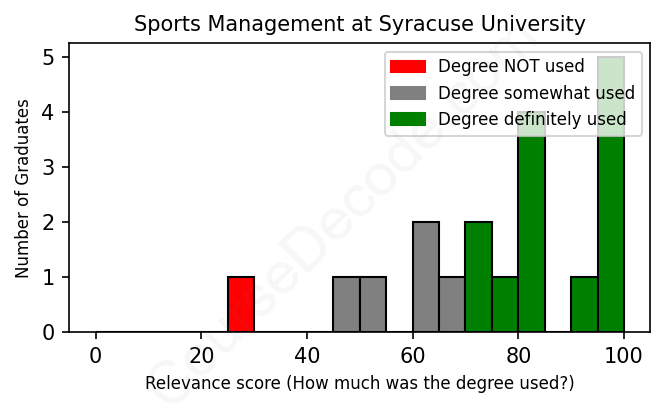
First, some facts. Of the Sports Management graduates from Syracuse University we've analyzed , here's how many have used (or NOT used) their degree in their career:

These are estimates based on AI analysis of 19 LinkedIn profiles (see below).
The verdict? Above average. Overall, with an average relevance score of 76%, Sports Management graduates from Syracuse University have a higher likelihood (+9%) of finding work in this field compared to the average graduate across all fields:
And for comparison, here's the chart for all profiles we've looked at across all degrees.
Also, after graduating, only 21% of these graduates have pursued further education other than another Bachelor's degree (such as a Masters degree or other), compared to the average across all profiles of 35%. This suggests a Bachelors degree is enough for most Sports Management graduates, and it's normal to look for work straight after graduation.
See the details:
|
Relevance score: 84% We think this person has gone into a career highly relevant to their degree. We think this person has gone into a career highly relevant to their degree.
DEGREE INFOGraduated in 2013 from Syracuse University with a Bachelor's Degree in Sports Management. No other secondary education since. JOB HISTORY SINCE GRADUATIONSixers Camps Operation/Coaching Intern Philadelphia 76ers Jun 2013 - Aug 2013 Marketing and Social Media Intern - KICKTV  Major League Soccer Nov 2013 - Aug 2014 Academy Head Varsity Soccer Coach  Valley Forge Military Academy & College Aug 2013 - Nov 2014 Social Media Producer/Editor  Team Whistle Nov 2014 - Jul 2016 Social Discovery Manager  Team Whistle Jul 2016 - Jul 2018 Senior Manger of Content Partnerships and Talent  Team Whistle Jul 2018 - Sep 2019 Director of Content Partnerships and Talent  Team Whistle Sep 2019 - Feb 2021 Head Of Media Talent Partnerships  Team Whistle Feb 2021 - Present VP, Media and Talent Partnerships  Team Whistle Feb 2022 - Present ABOUTNo information provided. |
The top 10 most common jobs done by the graduates we've analyzed (ranked most common to least) are:
After analyzing the job titles of graduates from Syracuse University's Sports Management program, it seems like a lot of them have ventured into roles that are directly tied to the sports industry, especially in areas like legal services, marketing, and sponsorship management. For example, many have become legal agents or attorneys focusing on sports law, which shows a blend of legal expertise and sports management skills. Others have taken on marketing positions, particularly in sports organizations, where they leverage the branding and promotional techniques that are vital in this field. There are also roles in event management and operational positions within teams and leagues, indicating a strong connection to the hands-on aspects of sports.
However, not every job on the list is directly relevant to sports management. Some graduates found themselves in roles related to general marketing, client services, or even in areas like hospitality and media production, which don't necessarily require the specific knowledge from their degree. While some of these jobs can involve transferable skills, they often stray from the central tenets of sports management. Overall, while many graduates are indeed working within sports-related contexts, the range of job relevance varies greatly, with a solid portion linking back to their studies in meaningful ways and others taking them on a different path altogether.
Here is a visual representation of the most common words in job titles for Sports Management graduates (this is across all Sports Management graduates we've analyzed, not just those who went to Syracuse University):

Graduates from Syracuse University's Sports Management program often kickstart their careers with internships or entry-level positions closely related to sports, marketing, or media. Notably, many of them land their first jobs in roles such as marketing interns at major sports teams or social media coordinators for sports organizations. For instance, graduates from 2013 and 2018 took on roles at the Philadelphia 76ers and Madison Square Garden, respectively. This strong start signifies that many alumni are able to leverage their education and network effectively right after graduation, allowing them to gain essential industry experience early on.
As these graduates progress five to ten years post-graduation, a distinct trend emerges: a considerable number transition into more specialized roles, often moving up the ranks in marketing, partnerships, or legal fields within the sports industry. Many have held positions like Vice President of Marketing at sports agencies or become certified agents for professional athletes. While some graduates have ventured into more unconventional routes, like working at DICK'S Sporting Goods or entirely different sectors, the majority seem to be maintaining relevance within the sports realm. Overall, it looks like Syracuse's Sports Management alumni tend to find their niche in various areas connected to their field of study, which bodes well for prospective students considering this path.
Honestly, getting a Bachelor’s degree in Sports Management at Syracuse University is about what you’d expect—it's not a walk in the park, but it’s not the hardest degree out there either. You’ll dive into a mix of business courses, sports law, marketing, and maybe even some psychology, which can be pretty engaging if you're passionate about sports. While there will definitely be challenging moments, like juggling projects and exams, if you stay organized and keep your interest alive, you’ll probably find it manageable. Just keep in mind that like any degree, it requires effort and dedication, but if sports are your thing, it can be a fun ride!
Most commonly, in the LinkedIn profiles we've looked at, it takes people 4 years to finish a Bachelor degree in Sports Management.
So, when you're looking at these Syracuse University Sports Management grads and their job paths, you'll see a mix of pretty solid paychecks along with some positions that might not be cashing in big bucks initially. Like, the older grads, especially those in legal roles or high-level marketing positions, are likely pulling in decent salaries—especially the ones who moved up to VP roles or started their own firms. The recent grads, on the other hand, are still in those entry-level or internship positions, which usually means not so much money right off the bat. But hey, everyone has to start somewhere, right? Overall, it looks like a decent mix where some are doing really well, while others are still grinding it out to get there.
Here is a visual representation of the most common words seen in the "about" section of LinkedIn profiles who have a Bachelor degree in Sports Management (this is across all Sports Management graduates we've analyzed, not just those who went to Syracuse University). This may or may not be useful:

Here are all colleges offering a Bachelor degree in Sports Management (ordered by the average relevance score of their Sports Management graduates, best to worst) where we have analyzed at least 10 of their graduates: